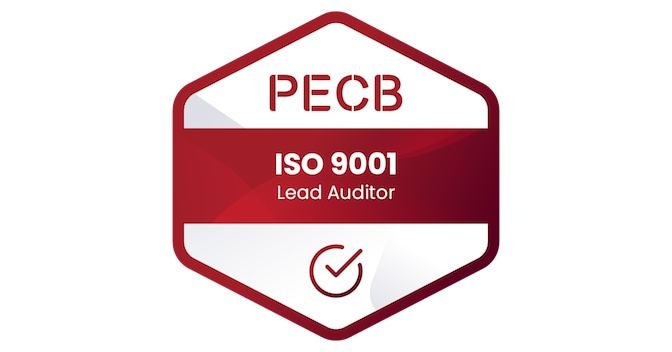Course Overview
The ISO 9001 Lead Auditor Certification Course is designed to equip professionals with the necessary skills and knowledge to effectively plan, conduct, and report on audits of Quality Management Systems (QMS) based on the ISO 9001:2015 standard. This comprehensive course provides participants with a deep understanding of audit principles, techniques, and best practices, enabling them to lead audit teams and contribute to the continual improvement of quality management within organizations.
The successful completion of the training course is followed by an exam. If you successfully pass the exam, you can apply for the “PECB Certified ISO 9001 Lead Auditor” credential. An UKAS accredited and internationally recognized “PECB ISO 9001 Lead Auditor” certificate validates your professional capabilities and demonstrates that you have the knowledge and skills to audit a QMS based on ISO 9001.
Upon successful completion of the course and passing the certification examination, participants will receive the ISO 9001 Lead Auditor Certification, demonstrating their competency in auditing Quality Management Systems according to ISO 9001:2015 standards.
Key Features of ISO 9001 Lead Auditor Training Course
- Comprehensive curriculum covering ISO 9001 standards and auditing principles
- Interactive sessions led by experienced ISO 9001 lead auditors
- Hands-on exercises and case studies for practical application of auditing techniques
- Guidance on audit planning, conducting audits, and reporting findings
- Preparation for ISO 9001 lead auditor certification exam
- Customized training materials tailored to the needs of participants
- Networking opportunities with industry professionals
- Access to resources and support for ongoing professional development
Why Choose CounselTrain for ISO 9001 Certification in Saudia Arabia?
Our ISO 9001 certification courses are meticulously designed to meet the unique needs of individuals and organizations in the Saudia Arabia, ensuring comprehensive coverage of ISO 9001 standards and auditing principles. Led by seasoned experts in the field, our courses combine theoretical knowledge with practical insights, equipping participants with the skills and confidence to excel as ISO 9001 auditors. Our commitment to excellence extends beyond the training room, as we provide ongoing support and resources to help individuals navigate their certification journey successfully. When you choose CounselTrain for ISO 9001 certification in the Saudia Arabia, you’re choosing expertise, reliability, and a pathway to professional success.
Target Audiance
- Auditors seeking to perform and lead QMS audits in behalf of certification bodies
- Professionals wishing to adopt PECB’s AMS2 Methodology for conducting audits
- Individuals responsible for maintaining conformity to the audits of ISO 9001
- Technical experts seeking to prepare for a QMS audit
- Professionals wanting to pursue a career in conformity assessment
ISO 9001 Certification Training in Saudia Arabia
ISO 9001 Certification Training in the Saudia Arabia holds paramount importance in today’s competitive market landscape. As businesses strive for excellence and customer satisfaction, adhering to internationally recognized quality management standards becomes imperative. ISO 9001 certification training signifies a commitment to quality, efficiency, and continuous improvement. In the Saudia Arabia, where excellence is synonymous with success, obtaining ISO 9001 certification not only enhances organizational credibility but also opens doors to new opportunities in both domestic and international markets. By investing in ISO 9001 Lead Auditor training, organizations equip their teams with the knowledge and skills necessary to implement and maintain robust quality management systems, thereby driving operational efficiency, customer satisfaction, and overall business success.


 4.8
4.8